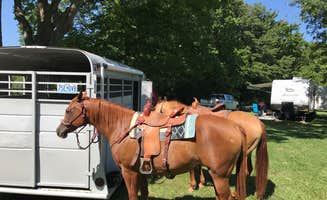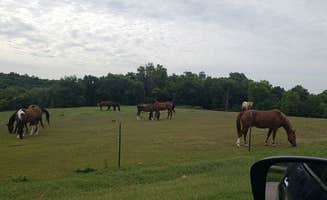Equestrian camping near Amazonia, Missouri centers around several conservation areas within a 50-mile radius of the town. This region features rolling hills with elevation ranges between 800-1100 feet and receives approximately 40 inches of rainfall annually. Most campsites in the area remain open year-round with seasonal temperature swings from below freezing in winter to humid 90°F days in summer.
What to do
Fishing access points: Honey Creek Conservation Area offers fishing opportunities along the Missouri River. "Good place for free camping just not a lot of things to do other than explore the woods or fish in the river which doesn't have great access. They say there's bike trails but it's more just access roads," notes Travis M. about Honey Creek Conservation Area.
Hiking trail exploration: Wallace State Park provides multiple trail difficulty levels within a compact area. "The trails around Wallace are fantastic. From a casual stroll around the lake to a more vigorous hike up the hill this park provides it all," explains Chad K. about Wallace State Park Campground.
Lake recreation: Smith's Fork Campground offers easy access to Smithville Lake for boating and swimming. "These RV spots have great shade, are spaced nicely apart, and are a quick walk to the lake! Amazing sunsets! You can rent a boat for a half day or full day with advanced notice," reports Steven N.
What campers like
Quiet weekday camping: Many conservation areas near Amazonia offer peaceful weekday experiences with minimal crowds. "A good spot if you are not interested in a busy campground. This is a beautiful wooded conservation area. We stayed at camp area 3 which is way more wooded and deep inside the conservation area with access to the river right on the site," shares Sayler O.
Budget-friendly options: Several free or low-cost camping alternatives exist within short driving distance. "It was a little close to the highway so got a little highway noise, but not bad. No trains. Only one other camper so plenty of room. Pit toilet, no water," writes William about Honey Creek Conservation Area.
Historical attractions: Beyond natural areas, several campgrounds provide access to historical sites. "We greatly enjoyed our visit and can't wait to go again! It is a smaller park than some however that is part of it's charm! Doesn't seem over crowded at all. Weston Bend State Park has an amazing hiking trail system within the park," explains Danielle H. about Weston Bend State Park Campground.
What you should know
GPS reliability issues: Many conservation areas have unreliable GPS directions, particularly when internal roads close. "Google Maps will take you on some gnarly gravel roads in a big loop if you take directions straight from Dyrt. Save yourself the time and search 'Honey Creek Conservation Area'," advises Kevin.
Water access limitations: Most primitive sites lack running water facilities. "The spot itself is decent. It's free. The campsites were super clean, but the bathrooms leave much to be desired. There are only really three or four designated campsites, but there was only one other group here on a Wednesday," notes Kevin.
Seasonal closures: Some campground facilities close during off-season periods. "After going around for almost 1.5 hrs from Smithville due to all the road closures, we finally got to the lake but all the campsites were out of commission to include the visitor's center and the roads were closed," reports James about Smiths Fork Recreation Area Camping.
Tips for camping with families
Playground proximity: Several campgrounds offer family-friendly amenities. "For entertainment, there was a bustling playground, winding nature trails, horseshoes, lake swimming, and fishing. There was also a well kept laundry house with a dishwashing sink attached," describes Sarah H.
Safety considerations: Conservation areas typically have minimal staffing, requiring additional self-reliance. "The campground is huge, with several loops and tons of sites. The RV loops were packed and felt really crowded, while the tent site loops were almost empty during our July visit," observes Sayler O. about Crow's Creek Campground.
Educational opportunities: Some parks offer historical or environmental education components. "Seems there are lots of things you can do while here, besides camping: fishing, birding, hiking & horseback riding," notes Linette G.
Tips from RVers
Leveling challenges: Many conservation area sites require additional equipment for proper RV setup. "The camp site were small and compact but it was nice. I for sure recommend campsite 26 anyone who comes and utilizes," suggests Spencer P. regarding Weston Bend State Park Campground.
Full hookup availability: Limited full-service RV options exist within the region. "Of everywhere Smith's Fork is the only one (so far) that offers Electric (30 & 50 amp), Water (2) and Sewer at every campsite. At just $30 per day it is a steal," states Don M.
Site size variations: RV sites differ significantly across conservation areas. "We switched from site 46 to site 53 as it was far more level and fairly private since it abutted woods. Campground host was really friendly in greeting us and accommodating our request to change sites," mentions Kevin S. about Wallace State Park Campground.



